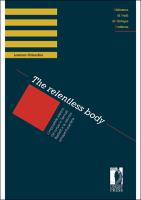The relentless body. L’impossibile elisione del corpo in Samuel Beckett e la noluntas schopenhaueriana
| dc.contributor.author | Orlandini, Lorenzo | |
| dc.date.accessioned | 2022-05-31T10:22:35Z | |
| dc.date.available | 2022-05-31T10:22:35Z | |
| dc.date.issued | 2014 | |
| dc.identifier | ONIX_20220531_9788866556855_444 | |
| dc.identifier.issn | 2420-8361 | |
| dc.identifier.uri | https://library.oapen.org/handle/20.500.12657/55160 | |
| dc.language | Italian | |
| dc.relation.ispartofseries | Biblioteca di Studi di Filologia Moderna | |
| dc.title | The relentless body. L’impossibile elisione del corpo in Samuel Beckett e la noluntas schopenhaueriana | |
| dc.type | book | |
| oapen.abstract.otherlanguage | The overbearing affirmation of the body, with its instincts and impulses, and an effort aimed at suppressing that same push: this powerful dialectic deeply marks Beckett's works, and becomes a crucial reflection of the more general tension between a vain waiting for the end and the need to move forward. The close investigation of the texts suggests a special link with the thought of Arthur Schopenhauer, revealing in particular the contiguity between the concept of Noluntas and the search, by many of Beckett's characters, for “will-lessness”, a peculiar state of quiet and abstraction from reality. Starting from these observations, this study investigates the theme of the body within Beckett's poetics, especially in light of his relationship with the Schopenhauer's Will theory. | |
| oapen.identifier.doi | 10.36253/978-88-6655-685-5 | |
| oapen.relation.isPublishedBy | bf65d21a-78e5-4ba2-983a-dbfa90962870 | |
| oapen.relation.isbn | 9788866556855 | |
| oapen.relation.isbn | 9788892734111 | |
| oapen.series.number | 21 | |
| oapen.pages | 208 | |
| oapen.place.publication | Florence |

